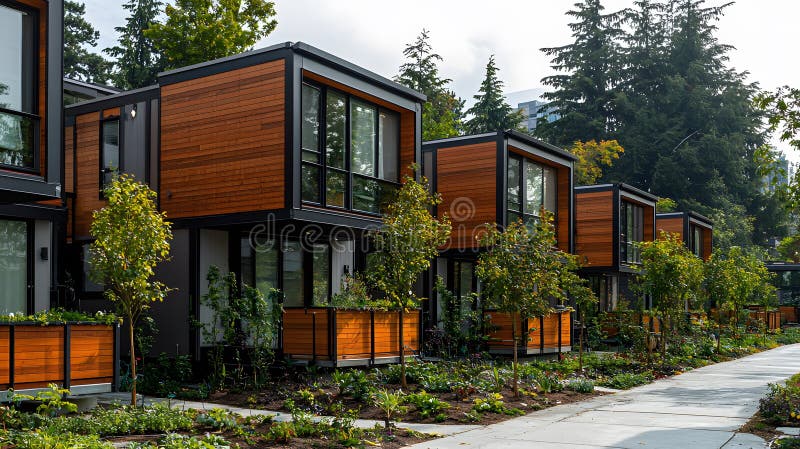
Common misconceptions about modular housing explained
In the world of housing and construction, modular housing often carries a mix of fascination and skepticism. Many people have several common misconceptions about modular housing, which could hold them back from exploring this dynamic and sustainable option. The truth is that modular housing is not only efficient but also a high-quality housing choice. In this article, we’ll dive into these misconceptions and uncover the realities that make modular housing a viable and attractive option for many.

What is Modular Housing?
Modular housing refers to homes that are built in sections or modules in a factory setting. These sections are then transported to the site and assembled into a finished home. Often confused with mobile homes, modular homes offer permanent, sturdy, and often very customizable living options.
Misconception 1: Modular Homes Are Just Like Mobile Homes
This is one of the most widely believed misconceptions about modular housing. While both modular and mobile homes are prefabricated, there is a significant difference in quality, design, and structure. Modular homes are built to the same codes as traditional stick-built homes and are permanently set on a foundation.
Misconception 2: Limited Design Options
Many believe that opting for a modular home means compromising on personal style and customization. The reality is quite the opposite. Modular homes offer a wide range of design choices and customization options. From floor plans to finishing details, homeowners can create a space that reflects their personal style. For design tips, check how to [choose best designs](https://thegoodhome.org/interior-design-tips-for-modular-homes/ ‘Interior Design Tips for Modular Homes’) (rel=’dofollow’).
Misconception 3: Poor Quality
A common myth is that anything built in a factory is inferior in quality. However, modular homes often undergo stringent quality control checks and are engineered for durability and performance. They have to meet the same building codes as site-built homes.
Misconception 4: Modular Homes Are Not Durable
Many people hold on to the misconception that modular homes are not built to last. Contrary to this belief, these homes are robust, with thick walls and top-grade materials. In fact, they can be engineered to withstand extreme weather conditions and can be an excellent solution for resilient housing.
Misconception 5: Difficult to Finance
People often think obtaining finance for a modular home is more complex than for a traditional house. The truth is, modular homes are treated the same as site-built homes when it comes to mortgages and insurance. Many financial institutions offer loans for modular housing, and you can learn more about coverage through modular [home insurance](https://thegoodhome.org/modular-home-insurance/ ‘Modular Home Insurance’) (rel=’dofollow’).
Misconception 6: Not Environmentally Friendly
The notion that modular housing isn’t eco-friendly is outdated. Modular homes are often more sustainable and energy-efficient than traditional homes. The construction process creates less waste, and the homes themselves can be designed to minimize environmental impact. Interested in low-carbon living? Check out how modular homes contribute to [low carbon solutions](https://thegoodhome.org/low-carbon-housing-solutions/ ‘Low Carbon Housing Solutions’) (rel=’dofollow’).
Misconception 7: Difficult to Resell
It’s a common belief that selling a modular home is harder and less profitable than selling a traditional home. In reality, they hold their value well, provided they are maintained and located on desirable property.
Misconception 8: Only Used for Budget Housing
While it’s true that modular homes can be an economical choice, they are not solely for budget-conscious buyers. They can range from basic and affordable to luxurious and expansive, catering to a wide range of preferences and budgets.
Misconception 9: Modular Means Prefabricated Low Quality
Prefabricated doesnt equate with low quality. Modular homes are precision-engineered in a controlled environment, ensuring each component is built with the utmost care and precision.
Misconception 10: Modular Homes Can Only Be Built In Summer
Another misconception is that modular homes can only be constructed during the sunny months. The factory building process allows for modular construction to happen year-round, minimizing delays associated with weather conditions.
Misconception 11: Modular Homes Are Less Safe
Some assume modular homes are less safe than traditional homes. In actuality, modular homes must meet all local, state, and regional building codes where theyre installed, making them equally safe.
Future of Modular Housing
As we debunk these misconceptions, its clear that modular housing is poised to be a significant player in the future of home construction. For more insights on how modular homes can shape the future, check out this informative blog here.
How to Choose a Modular Home Builder
Interested in modular housing and not sure where to start? Selecting the right builder is key. For insights, read tips on how to choose a modular home builder.
Conclusion
Modular homes offer a promising and practical alternative to traditional housing, breaking stereotypes with their quality, flexibility, and efficiency. By understanding and dispelling these common misconceptions about modular housing, you can make informed decisions about whether this type of construction is right for you.

FAQ
1. Who can benefit from modular housing?
Anyone looking for a cost-effective, sustainable, and customizable home option, including first-time buyers, retirees, and eco-conscious individuals.
2. How long does it take to build a modular home?
A modular home can be completed in about 8-14 weeks, depending on complexity and customization.
3. Can modular homes be customized?
Yes, modular homes can be highly customized in terms of layout, fixtures, and finishes to suit individual preferences.
This article contains affiliate links. We may earn a commission at no extra cost to you.